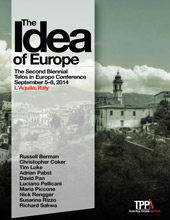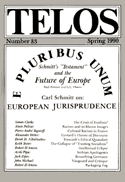By Telos Press · Wednesday, November 12, 2014 Speaking at the 2014 Telos in Europe Conference, Neil Turnbull considers the prospects for the European project as we move from the Westphalian age of nation-states to a new age of empires. What kind of empire is now emerging in Europe, and what form will it take in the future?
Continue reading →
By Adrian Pabst · Thursday, September 11, 2014 The following paper was presented at the recent Telos in Europe conference on “The Idea of Europe,” held in L’Aquila, Italy, on September 5–8, 2014.
 The continual crisis in Ukraine is perpetuating an East-West schism that was never overcome after the end of the Cold War. Even if there is no all-out war between the major powers involved in the Ukrainian conflict, Europe faces the distinct prospect of a permanent divide at its very heart. The EU increasingly looks like an annex to the United States, which oscillates between isolationism and interventionism. Meanwhile Russia is fast becoming a vassal state that supplies cheap resources to China. After more than 500 years at the center of international affairs, the whole of Europe is bereft of ideas and incapable of acting as a force for good. The continual crisis in Ukraine is perpetuating an East-West schism that was never overcome after the end of the Cold War. Even if there is no all-out war between the major powers involved in the Ukrainian conflict, Europe faces the distinct prospect of a permanent divide at its very heart. The EU increasingly looks like an annex to the United States, which oscillates between isolationism and interventionism. Meanwhile Russia is fast becoming a vassal state that supplies cheap resources to China. After more than 500 years at the center of international affairs, the whole of Europe is bereft of ideas and incapable of acting as a force for good.
Continue reading →
By Artemy Magun · Tuesday, March 11, 2014 The ongoing take over of Crimea by Russia, and its intense political campaigning to annul the results of the Kiev revolution, took most observers of international politics by surprise. Normally, one has not been considering Russia as a serious contender of the United States for hegemony, as a country with serious economic or military resources, or even as a country with a particularly serious ideology. American and European political science has for decades been busy with “transitions to democracy” and the evaluation of their relative successes (even though there is a recent shift toward the study of authoritarianism), and in International Relations, China seemed to be the only possible opponent to U.S. unilateral hegemony. European Studies examines the various neighborhood policies of the European Union, measuring their relative success in “democratization.” The U.S. and European leaders therefore reacted to the events in Russia and Ukraine with surprise: John Kerry spoke of Russia’s “nineteenth-century behavior,” and Angela Merkel described Putin as being delusional, living “in another world.” This correctly describes the huge discrepancies in worldviews and values, but the views and values of Russian leadership, whether delusional or not, have very real effects, and therefore represent a repressed part of the reality about which the Western leaders do not want to think.
Continue reading →
By Linas Jokubaitis · Tuesday, February 18, 2014 As an occasional feature on TELOSscope, we highlight a past Telos article whose critical insights continue to illuminate our thinking and challenge our assumptions. Today, Linas Jokubaitis looks at Paul Piccone and Gary Ulmen’s “Schmitt’s ‘Testament’ and the Future of Europe” from Telos 83 (Spring 1990).
 When Schmitt drafted his lecture “The Plight of European Jurisprudence” in 1944, he had reasons to believe that it would be his last lecture. After a failed assassination attempt on Hitler, his friend Johannes Popitz was arrested as an important conspirator in the plot and was later put to death. This is why the article by Paul Piccone and Gary Ulmen on this lecture is called “Schmitt’s ‘Testament’ and the Future of Europe.” The lecture did not prove to be Schmitt’s last. The irony is that what Schmitt wrote as his own testament can today be read as a testament of Europe. The validity of this claim depends only on how one views the current state of Europe. When Schmitt drafted his lecture “The Plight of European Jurisprudence” in 1944, he had reasons to believe that it would be his last lecture. After a failed assassination attempt on Hitler, his friend Johannes Popitz was arrested as an important conspirator in the plot and was later put to death. This is why the article by Paul Piccone and Gary Ulmen on this lecture is called “Schmitt’s ‘Testament’ and the Future of Europe.” The lecture did not prove to be Schmitt’s last. The irony is that what Schmitt wrote as his own testament can today be read as a testament of Europe. The validity of this claim depends only on how one views the current state of Europe.
Continue reading →
|
|
 The continual crisis in Ukraine is perpetuating an East-West schism that was never overcome after the end of the Cold War. Even if there is no all-out war between the major powers involved in the Ukrainian conflict, Europe faces the distinct prospect of a permanent divide at its very heart. The EU increasingly looks like an annex to the United States, which oscillates between isolationism and interventionism. Meanwhile Russia is fast becoming a vassal state that supplies cheap resources to China. After more than 500 years at the center of international affairs, the whole of Europe is bereft of ideas and incapable of acting as a force for good.
The continual crisis in Ukraine is perpetuating an East-West schism that was never overcome after the end of the Cold War. Even if there is no all-out war between the major powers involved in the Ukrainian conflict, Europe faces the distinct prospect of a permanent divide at its very heart. The EU increasingly looks like an annex to the United States, which oscillates between isolationism and interventionism. Meanwhile Russia is fast becoming a vassal state that supplies cheap resources to China. After more than 500 years at the center of international affairs, the whole of Europe is bereft of ideas and incapable of acting as a force for good.  When Schmitt drafted his lecture “The Plight of European Jurisprudence” in 1944, he had reasons to believe that it would be his last lecture. After a failed assassination attempt on Hitler, his friend Johannes Popitz was arrested as an important conspirator in the plot and was later put to death. This is why the article by Paul Piccone and Gary Ulmen on this lecture is called “Schmitt’s ‘Testament’ and the Future of Europe.” The lecture did not prove to be Schmitt’s last. The irony is that what Schmitt wrote as his own testament can today be read as a testament of Europe. The validity of this claim depends only on how one views the current state of Europe.
When Schmitt drafted his lecture “The Plight of European Jurisprudence” in 1944, he had reasons to believe that it would be his last lecture. After a failed assassination attempt on Hitler, his friend Johannes Popitz was arrested as an important conspirator in the plot and was later put to death. This is why the article by Paul Piccone and Gary Ulmen on this lecture is called “Schmitt’s ‘Testament’ and the Future of Europe.” The lecture did not prove to be Schmitt’s last. The irony is that what Schmitt wrote as his own testament can today be read as a testament of Europe. The validity of this claim depends only on how one views the current state of Europe. 

